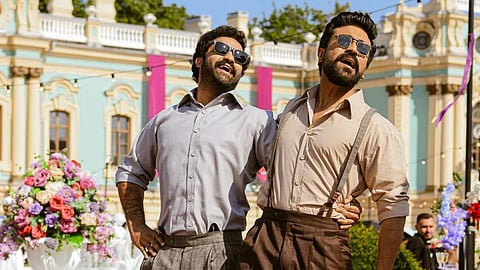

NEW DELHI: India found itself in a jubilant mood this week after SS Rajamouli’s epic period drama RRR bagged the coveted honour of Best Original Song for Naatu Naatu at the 80th Golden Globe Awards. This is the first time that an Asian song won this prize and social media was abuzz with congratulatory notes from stalwarts across the industry.
While the adulation directed towards this all-out commercial entertainer from the South is welcome, there are questions worth pondering upon. One of them is whether such recognition from the global film fraternity is indicative of the internationalisation of Indian cinema. Secondly, has this win broken through that proverbial great wall that separates our films from theirs. The two questions are rhetorical as India’s films have struck a chord with world cinema audiences for over 70 years now.
Beginning with Neecha Nagar in 1946, which was the first Indian film to be honored at Cannes, to Satyajit Ray’s Pather Panchali (1956) which was awarded the Best Human Document Prize at the festival, to the likes of The Lunchbox (2013), which picked up a Critics Week Viewers Choice Award, our representation at international festivals is commendable. Now with the arrival of OTT platforms, the distribution of cinema has been redefined. Films that might probably not have seen the light of the day in theatres, now still have an opportunity to be exhibited on streaming platforms for a global audience.
But one must realise that, when it came to Indian films making an impression in international waters, the de-facto standard happens to be arthouse or parallel cinema classics that would be devoid of the usual elements that are packed into mass entertainers — lavish sets, big budget song and dance sequences, million-dollar action set pieces crafted using state of the art CGI and so on —something RRR is loaded up on.
In fact, the victory of RRR at the Golden Globes, had buoyed the hopes of its filmmakers that an Oscar nomination might be in the pipeline. The team cannot be faulted for its aspirations considering how in 2008, Slumdog Millionaire, which was Brit filmmaker Danny Boyle’s adaptation of the novel Q&A, recorded a dream run of eight Oscars including Best Picture and Best Original Song. Back then, the film was mired in controversy for its unappealing portrayal of India’s economic underclass, which many observers referred to as ‘poverty porn’ for the West.
The Bollywood-styled spectacle of squalor was accused of further contributing to the marginalisation of the poor in the country. It’s ironic considering how a majority of the nation’s filmmakers have lost touch with the reality of modern India for several years now, churning out one populist offering after the other, peppered with dreams of an ‘aspirational’ India.
The success of a RRR in an international arena, is offset by the vitriol directed at upcoming films like Pathaan, which is being pilloried for its ‘obscene’ depiction of stars. In fact, Twitter was simultaneously rife with memes on how even the makers of the controversial film, The Kashmir Files, which was called out by an Israeli filmmaker as a propaganda piece, should now pitch their film to the Oscar committee.
It’s essential that India as a nation learns to differentiate between artistic merit and populist fanfare. There are several films hailing from diverse corners of the country that merit representation on international fora. But those intimate stories might remain untold in the backdrop of the din generated by the multi-crore blockbusters.
Visit news.dtnext.in to explore our interactive epaper!
Download the DT Next app for more exciting features!
Click here for iOS
Click here for Android